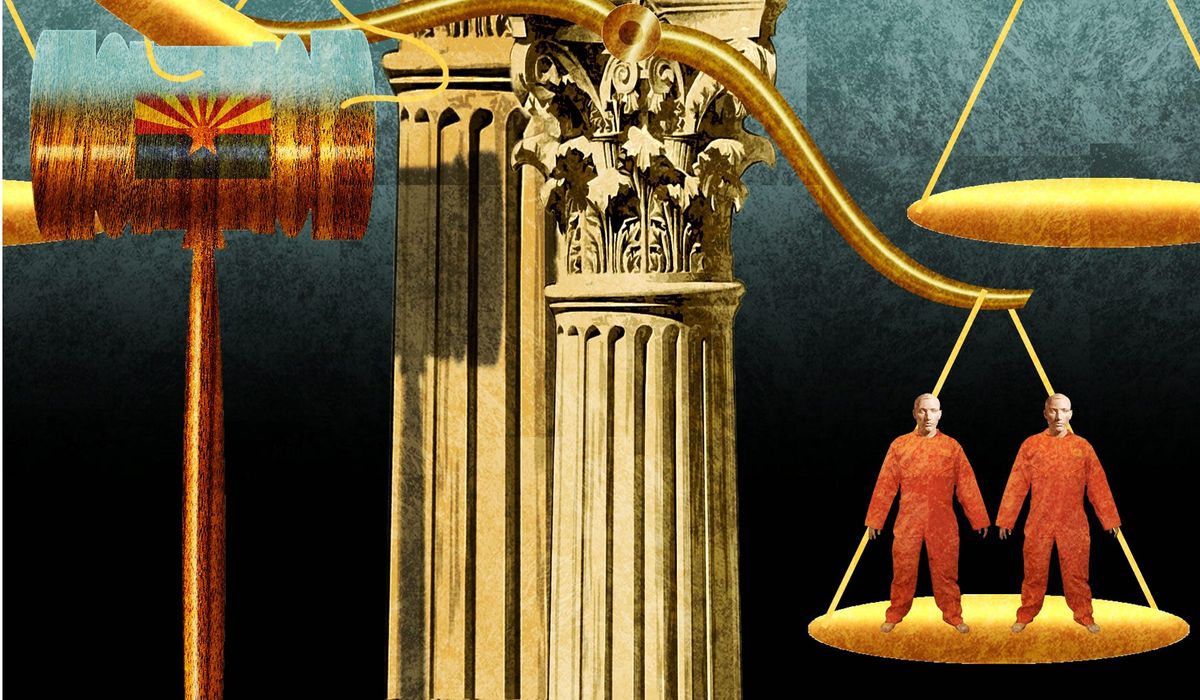OPINION:
With many Americans focused on headline-grabbing U.S. Supreme Court cases, it would be easy to miss a critically important case that has flown under the radar: Shinn v. Jones and Ramirez. Despite the consolidated case’s low-profile, it has the potential to fundamentally reshape the criminal justice system in a manner that should offend conservatives’ core sensibilities — that of protecting life, liberty, and unalienable rights.
The case revolves around something quintessentially American — the right to an attorney and a fair trial. According to decades-old case law, the Sixth Amendment provides Americans the right to “effective assistance of counsel,” but not all lawyers are created equal. There are plenty of reports of defense attorneys showing up to court drunk, sleeping during the trial or simply ignoring exculpatory evidence. Thanks to the Sixth Amendment, if an attorney’s assistance was so inadequate that it influenced the case’s outcome, then the courts can order a retrial.
To obtain such relief, appellants must traverse the arcane appeals process, but if state appellate courts rebuff them, they can apply for relief in federal court via a writ of habeas corpus. This process is incredibly time-consuming. In fact, the time between sentencing and execution in capital cases can easily exceed 20 years.
During the interim, new evidence of ineffective counsel can arise, which brings us to the crux of Shinn v. Jones and Ramirez, and the stakes are high — very high. Both Barry Jones and David Ramirez face death sentences for separate cases in Arizona, but appeals attorneys presented evidence in federal court, questioning their verdict and sentence, respectively.
In 1995, despite steadfastly maintaining his innocence, Mr. Jones was convicted of an unconscionably heinous crime — child abuse resulting in death — although there is evidence that suggests he may not be guilty. Medical evidence available at the time would have poked holes in the prosecutors’ case against Mr. Jones, according to court documents, but his counsel failed to introduce it. While I can’t say for certain whether Mr. Jones is innocent, it seems that the jurors passed their verdict based on incomplete evidence.
Meanwhile, Mr. Ramirez’s guilt isn’t in question. A jury convicted him in 1990 of a gruesome double murder. Still, there’s reason to believe that Mr. Ramirez suffers from an intellectual disability, has brain damage, and endured serious childhood trauma. However, his lawyers originally failed to provide any evidence of this. Why is this important? Because mitigating evidence such as this would have virtually ensured that he received a sentence other than death.
Mr. Jones’ and Mr. Ramirez’s new attorneys have since brought the aforementioned evidence to light in federal court. They claimed that more effective counsel could have easily raised all of this evidence during the original trials, and as a result, their clients deserve retrials. It’s not unheard of for appeals attorneys to make such 11th-hour assertions in desperate bids to save their clients, but they made a good case. How good? Federal courts overturned Mr. Jones’ conviction and ordered a new hearing for Mr. Ramirez.
Normally, this would ultimately trigger a retrial for Mr. Jones and a new sentencing hearing for Mr. Ramirez, but instead, the State of Arizona appealed the decision. Citing a provision in the Antiterrorism and Effective Death Penalty Act of 1996 (AEDPA), Arizona asserts that new evidence demonstrating the ineffectiveness of counsel cannot be considered in habeas petitions if the defendant’s lawyers neglected to develop the evidence in state court proceedings.
The State of Arizona’s interpretation of the AEDPA is unique, to say the least. To date, no appellate court has adopted such a reading, and the United States District Court in Arizona found the State of Arizona’s argument laughable, calling it “simply illogical.” After all, it makes no sense for the law to allow federal courts to entertain evidentiary hearings on claims of ineffective counsel but then to forbid the consideration of the same evidence simply because post-conviction relief counsel failed to raise it in state court.
If the U.S. Supreme Court sides with Arizona, the state will subsequently execute Mr. Jones and Mr. Ramirez despite the evidence. This will also set a dangerous precedent that new evidence of ineffective counsel — in all criminal cases, not just capital cases — can never be considered in federal court even though such claims almost always rely on new evidence.
This will lead to insidious effects that will reverberate throughout the criminal justice system—ensuring that an untold number of Americans, including the wrongly convicted, will never get a fair trial. This should concern all Americans—especially the U.S. Supreme Court’s conservative wing.
Conservatives believe in law and order, but you can have neither as long as Americans are wrongly denied their constitutional rights and stripped of their lives and liberties. Yet, that could become a regular occurrence if the U.S. Supreme Court rules in favor of Arizona.
• Marc Hyden is the director of state government affairs at the R Street Institute—a free-market think tank—and he used to work for the National Rifle Association.

